IIR’s contribution and key outcomes at COP29
The International Institute of Refrigeration actively participated in COP29/CMP19/CMA6 held in Baku, Azerbaijan, from 11 November to 22 November 2024, contributing to key discussions and fostering discussions and awareness about the role of refrigeration and heat pump technologies in both human and climate action.
COP29 saw significant global discussions on the climate crisis, with some critical outcomes advancing the future of climate action. Among the most notable developments was the announcement of climate finance pledges, where developed nations committed $300 billion annually by 2035 to support developing countries in tackling the climate impacts they face. While this is an important step, the pledged amount falls short of the $1.3 trillion that developing countries had requested. Despite the disappointment, the deal was accepted by developing nations to ensure that progress was made at the summit.
On the issue of fossil fuel transition, progress was slow, with strong resistance from petro-states hindering the adoption of comprehensive measures to phase out fossil fuels and transition to renewable energy. However, a positive development came in the form of an agreement on carbon markets, with a new framework for UN standards on international carbon markets aimed at providing more structured, market-based solutions to address climate change.
The IIR was fully engaged in COP29, contributing to crucial discussions on sustainable and energy efficient refrigeration technologies, highlighted the role of adopting low GWP refrigerants and the crucial role of the Kigali Implementation Plan for the reduction of hydrofluorocarbons (HFCs) in the ratifying countries according to the Montreal Protocol schedule. As the only intergovernmental organisation solely focused on refrigeration and heat pumps, IIR’s involvement underscored the importance of these sectors in achieving broader climate goals.
During the first week, Marco Duran, head of IIR Policy and Global Partnerships, engaged in multiple expert sessions, side events and working sessions ensuring that the crucial role that refrigeration has for sustainable development and climate action was well reflected in the discussion.
The IIR was invited to the opening ceremony of the World Leaders Climate Action Summit, with representations of the heads of state and to the COP29 Summit on Methane and Non-CO2 Greenhouse Gases, hosted by the COP29 presidency together with the US and China. The session underscored the critical role of addressing non-CO2 gases, including HFCs, which are responsible for up to half of total greenhouse gas emissions. Both events were attended by Marco Duran and Petter Nekså, delegate to the IIR on behalf of Norway. On November 14, the IIR took part in a key side event, “Cooling the Heat: Enhancing Efficiency of the Refrigeration and Cooling Sector”, organised by the Ozone Secretariat and partners. Meg Seki, Executive Secretary of the Ozone Secretariat, opened the event by highlighting the role the Montreal Protocol has in climate action. Marco Duran delivered a keynote presentation to set the scene on why sustainable refrigeration and cooling are key for the climate agenda, and on the importance of enhancing energy efficiency in cooling technologies and strengthening the cold chains globally. A panel moderated by Shikha Bhasin from the Cool Coalition brought technical experts and policymakers together to discuss solutions to improve energy efficiency in the cooling sector.
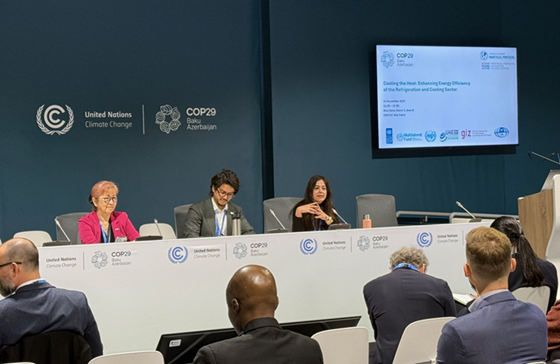
The IIR organised an official side event in collaboration with Alliance for an Energy Efficient Economy (AEEE), CLASP, and Sustainable Energy for All (SEforALL), on “Tracking Efficiency Progress in the Global South” that took place on Friday, 15 November. The session was opened by Yosr Allouche, who set the context in an introductory recorded speech before giving way to the panel, moderated by Bishal Thapa (CLASP). Graeme Maidement (President, IIR Commission E2) stressed that accurate tracking mechanisms are essential for aligning national energy efficiency targets with global climate commitments and provided examples based on the UK government’s experience. Marina Almeida (E+ Institute, Brazil) presented case studies from Latin America, illustrating how well-designed tracking systems can support climate resilience. Uboho Ekpo (National Council on Climate Change, Nigeria) also provided perspectives from the progress in tracking information in the context of the Nigeria NDC and pledges. Pramod Singh (AEEE) highlighted the role of public-private partnerships and financial mechanisms in driving energy efficiency adoption.
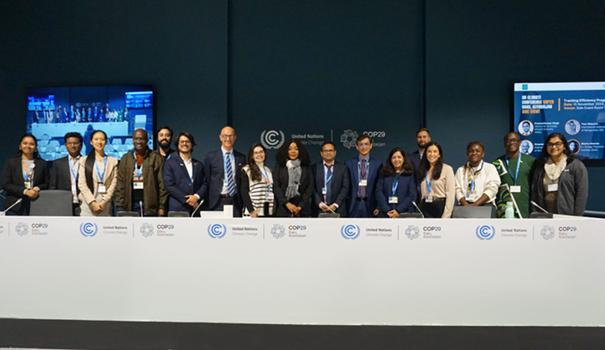
Furthermore, the IIR participated along other pledges signatories and partners in the Working Meeting dedicated to the Global Cooling Pledge (GCP) at COP29. The session was organised by the COP28 Presidency of the United Arab Emirates (UAE) and the UNEP-led Cool Coalition and it was designed to identify the needs and priorities to advance in achieving the pledge’s commitments. Some of the key areas to focus discussed were, gather data and establish the baselines with countries to track progress and continue close engagement with countries to understand needs and support with matchmaking and access to finance.
During the second week, IIR’s Director General, Yosr Allouche, played an active role in multiple sessions and side events, providing valuable insights and facilitating discussions on the intersection of refrigeration and heat pumps, energy efficiency, and climate action.
One of the key events was the side event on “Equitable South-North Partnerships in Sustainable Energy, Research, Innovation, and Higher Education,” hosted by the Norwegian University of Science and Technology (NTNU) and the Norwegian Research Centre SINTEF. During this session, Yosr Allouche discussed how universities and research collaborations can support the green energy transition, particularly in the refrigeration sector. Emphasising the importance of attracting young talent to the sector, she highlighted how equitable partnerships in research and innovation can strengthen local capacities and drive sustainable change in the refrigeration and cooling industries.
Additionally, Yosr Allouche participated in the Cool Coalition Interministerial Round Table focused on the Global Cooling Pledge, which was launched at COP28. The pledge, aimed at reducing cooling-related emissions by 68% by 2050, brought together key stakeholders to discuss its implementation so far. Yosr Allouche underscored the importance of the pledge and the need for accelerated action to reduce emissions from refrigeration technologies, which are essential to tackling extreme heats.
Another session moderated by Yosr Allouche was “Financing the Adoption of Passive Cooling Strategies for a Cooler Future” at the Cool Coalition and Global ABC Pavilion. This session focused on the importance of passive cooling strategies to reduce reliance on mechanical cooling systems. With the global demand for space cooling rising sharply, passive space cooling strategies provide a sustainable solution to curb the growth in energy demand while mitigating climate impacts. Yosr Allouche moderated discussions with representatives from IFC, India, African countries, who shared insights into how these countries are adopting passive space cooling technologies and overcoming the financial challenges associated with such initiatives.
At the high-level segment of COP29, Yosr Allouche delivered the IIR’s statement, emphasising the crucial role of refrigeration, heat pumps, and cold chains in achieving climate goals. She highlighted how these technologies are indispensable not only for ensuring food security and protecting health but also for advancing economic stability. As the global demand for refrigeration continues to rise, particularly due to extreme heat events, the importance of energy-efficient refrigeration technologies and the adoption of clean, low-GWP refrigerants was underscored. Yosr Allouche called for greater focus on renewable energy and energy-efficient solutions to curb the growing energy demand from the refrigeration and heating sectors, which together account for nearly a fifth of global electricity consumption.
IIR’s participation in COP29 was a significant step forward in raising awareness about the crucial role of refrigeration and heat pump sectors as vital components of climate action and informing about the latest scientific insights of these sectors. While the outcomes reaffirmed the critical contribution of these sectors to achieving global climate targets, more efforts are needed at this level. The IIR is committed to working closely with UN agencies and other partners to raise awareness among policymakers about the essential role of refrigeration in ensuring global food security and safeguarding temperature-sensitive health products for global health security. Furthermore, the IIR emphasises the vital role of heat pumps in decarbonising the heating sector and supporting energy security. To this end, activities must be intensified to better inform policymakers and decision-makers about the latest innovative scientific solutions available, ensuring the development of policies that effectively address these pressing challenges.
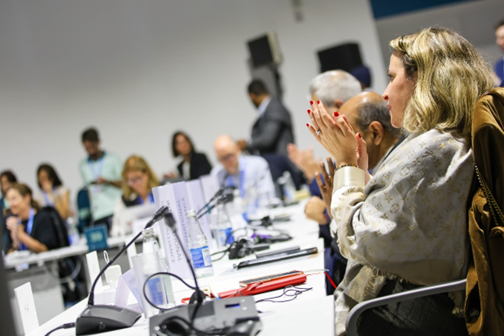

IIR Director General Yosr Allouche attending the Cool Coalition ministerial roundtable on the Global Cooling Pledge
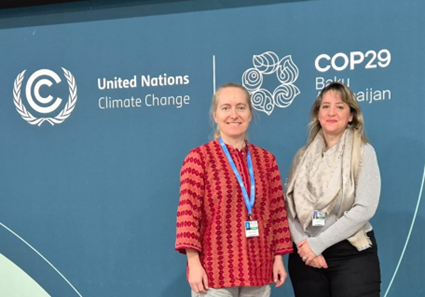
Yosr Allouche and IIR expert Kristina Norne Widell (SINTEF Ocean)
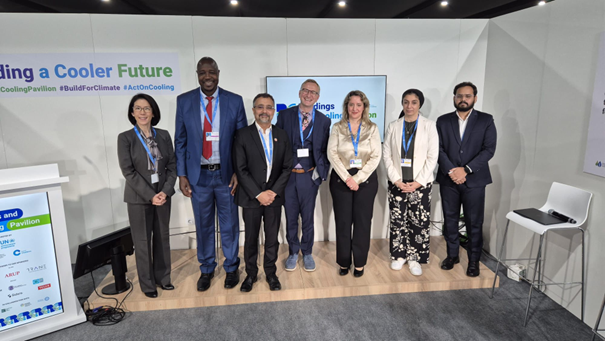
The “Financing the Adoption of Passive Cooling Strategies for a Cooler Future” Panel moderated by Yosr Allouche and gathering speakers from IFC, AEEE and officials from African countries
